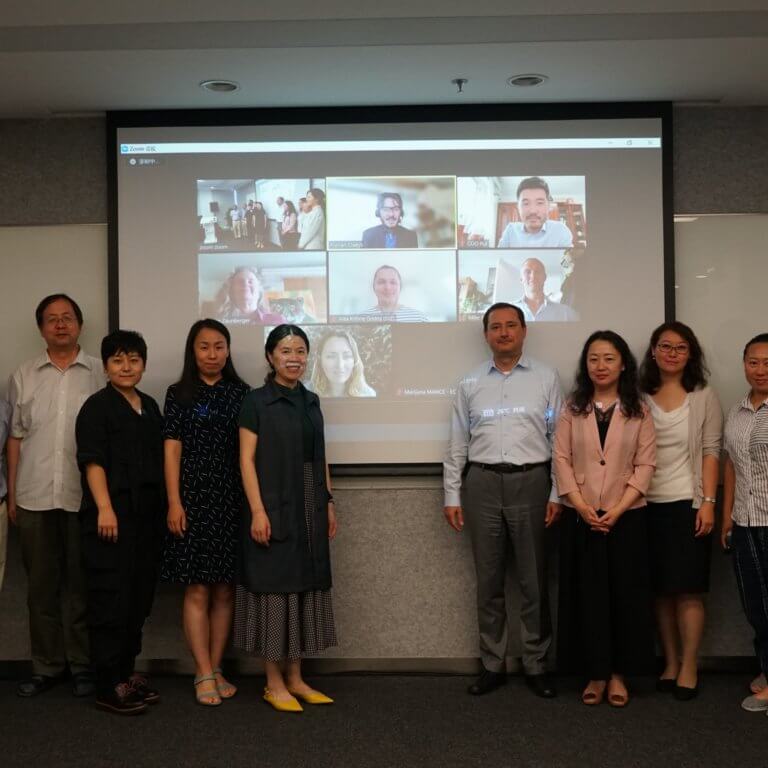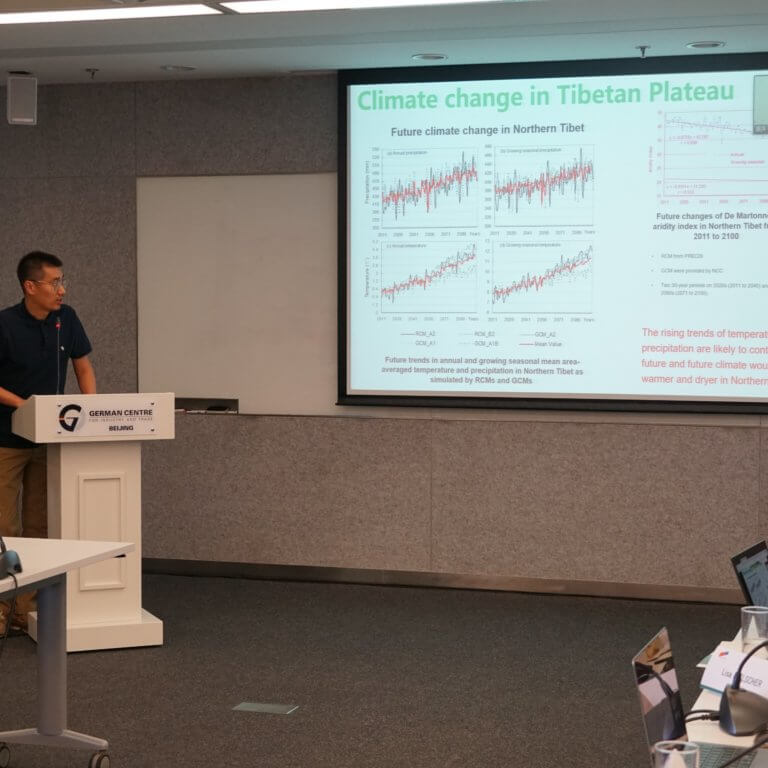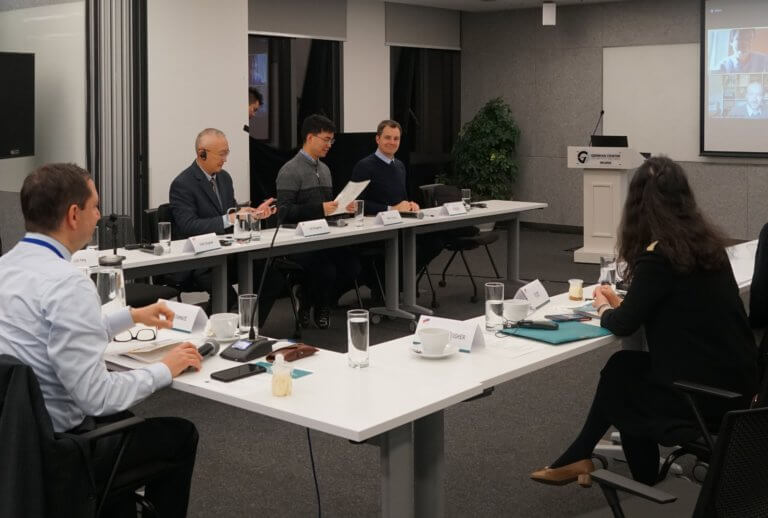On 8 November 2021, the COP 26 side event Land on Climate and Biodiversity: Scientific Challenges and Highlights from EU-China Cooperation took place in Glasgow. This session was organized by the European Commission’s Joint Research Centre (JRC) and Strategic Partnerships for the Implementation of the Paris Agreement (SPIPA) implemented by GIZ.
The session drew highlights from a series of EU-China expert dialogues focusing on the frontier and challenges in land sector research for climate actions and biodiversity conservation, aiming to deepen exchange between experts and promote the development of science-based policy with recommendations for academics and policymakers alike. The session was moderated by Florian CLAEYS from DG CLIMA of the European Commission. Amongst its distinguished guests, the session included representatives from both Chinese and European academic and research institutions.
The opening session was kicked off by Mr. Octavian STAMATE who serves as the counsellor for climate action and energy at the EU Delegation to China. He expressed the importance of this event as the culmination of a series of events in Beijing over the past eight months and highlighted the key role of meetings at an expert level as complementary to those at a high level between officials. On the Chinese side, Prof. ZHANG Xiliang who serves as the Director at the Institute of Energy, Environment and Economy at Tsinghua University, stressed the importance and cost-effectiveness of LULUCF approaches in China’s goals to achieve carbon neutrality and their promotion as evidenced by the high priority that has been given to LULUCF issues by the National Natural Science Foundation of China (NSFC) in their carbon neutrality research program. He further highlighted the need for additional research to accurately assess and harness the potential for carbon removal through these approaches.
From the European side, the first presentation was given by Dr. Giacomo GRASSI, senior researcher at the European Commission JRC, who presented the findings of a study by the JRC on adjusting land use mitigation pathways for assessing collective climate progress under the Paris Agreement. He stressed the importance of like-for-like comparisons in the five year Global Stocktake (GST), and the difficulties in doing so when there is a large disparity in what is considered anthropogenic carbon sink between National Greenhouse Gas Inventories (NGHGIs) and Integrated Assessment Models (IAMS). He explained the efforts that have been made to translate IAMs to make them conceptually comparable to countries reported carbon sinks, finding that the consequently proposed adjustment had a significant impact on countries in terms of how much of their carbon budget they perceived to be remaining. He concluded that this research stands out as an example of scientific research that has rapidly impacted policymaking as evidenced by the adjustments used in the UNFCC’s Synthesis Report on NDC.
The next presentation was given by Prof. Martin HEROLD from Waginingen University, who presented on the topic of Earth Observations towards spatially explicit Agriculture, Forestry and Other Land Use (AFOLU) GHG assessment and inventories. He outlined findings in the utility of satellite data to augment other data sources, presenting more solid and timely data as to land use change. He particularly highlighted space-based biomass estimation’s use in improving the accuracy of forest biomass estimation, with examples of weekly data as to logging in the Central African Republic. Finally, Prof. HEROLD offered recommendations to the European side in harnessing the power of the Copernicus satellite program to provide such data and suggested that in the future national forestry information (NFI) and satellite data should be combined to cover areas not currently covered by NFIs, and that this should be linked to land mitigation and forest management activities under the UNFCC GST. He concluded that with better data global estimations could be linked much more accurately to national estimations.
From the Chinese side, the first presentation was given by Prof. LI Renqiang from the Institute of Geographic Sciences and Natural Resources at the Chinese Academy of Sciences (CAS), who presented research on the roles of biodiversity conservation in climate change mitigation. He stressed the importance of biodiversity conservation in addressing the challenges to ecosystem functioning and human wellbeing posed by accelerated redistribution of species. Prof. LI discussed findings of a strong congruence between carbon sinks and the richness of endangered species in China to emphasise the importance of biodiversity conservation in terms of its co-benefits for mitigating climate change in China’s terrestrial ecosystems. He explained that this was found to be the case even for conservation and climate change mitigation at the species level, as was found in the strong role that giant panda reserves play in capturing carbon, as compared to matched non-reserve areas. He stressed the great carbon sequestration potential of China’s ecosystem, recommending that future planning should bear in mind climate change mitigation and biodiversity conservation co-benefits, to maximise potential in cost-effective nature-based solutions, and reach goals as set out in the Paris Agreement.

Next, Prof. CHEN Minpeng from Renmin University presented a paper on Science-informed Policy on Agriculture and Land for Climate and Biodiversity which was based on the 6th Sino-European Expert Dialogue on Long-Term Development. She stressed that as agricultural and land-use changes are among the main drivers of both global climate change and biodiversity loss, that it is crucial to intensify research and policies to address agriculture and land use. She went on to assert that as the AFOLU sector achieves the triple benefit of adaptation, mitigation and biodiversity conservation, science must be used to enhance understanding and identify solutions in this sector. Prof. CHEN provided several recommendations for policymakers, including: scaling up the implementation of practical solutions, promoting integrated collaborative governance to improve decision making at different levels, and providing technical support, education and capacity building to land managers and other important decision-makers to promote the adoption of innovative solutions, as well as providing economic incentives for economic actors. She further mentioned the importance of multi-stakeholder forums to provide more training to local authorities and suggested the promotion of research on the application of practical solutions particularly nature-based solutions as a fruitful area to achieve the tripe benefit of mitigation adaptation and biological conservation. On the technical side, Prof. CHEN recommended strengthening scientific work in the AFOLU sector, particularly in the form of joint modelling work and multi-objective collaborative pilots, as well as continued dialogues to bring together experts in biodiversity conservation and to enhance their communication and dissemination of good practice.
Mr. Octavian STAMATE wrapped up the event, directing the audience towards the accompanying report booklet which includes excerpts from the presentations, elaborates on the state of play of research, and presents recommendations for policymakers in designing science-based policies. Finally, he expressed his hopes to carry out more such expert meetings over the next few months to enhance communication and build trust between the EU and China to act together on climate in a bottom-up way.



